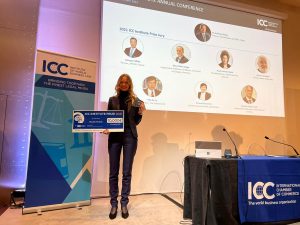Institute Prize
Brooke Marshall wins 2021 ICC Institute Prize
The ICC Institute of World Business Law awarded the 2021 ICC Institute Prize to Brooke Marshall on 29 November for her thesis on “Asymmetric jurisdiction clauses”.

The biennial prize honours legal writing excellence that looks to innovate in the field of international commercial law, including arbitration. It is open to anyone aged 40 or under.
A total of 17 submissions were received by authors of 13 nationalities from four continents. All entries were carefully reviewed by an international jury comprising eight Council members of the ICC Institute.
Head of the jury and ICC Institute Council member, Ercument Erdem said: “Ms Marshall’s thesis was on a very interesting topic, which is not widely elaborated on at an international level. We found, as the jury, that Ms Marshall’s approach to the topic was both rigorous and original. She employed an economic analysis in a very careful and illuminating way that added to the paper’s credibility.
We are grateful to Ms Marshall for bringing the topic of party autonomy for jurisdiction clauses into the spotlight and believe that the insights shared in her thesis will be useful not only to scholars and policymakers but the entire international business community.”
Ms Marshall’s thesis addresses a contentious legal issue in international commercial contracting. Asymmetric jurisdictional clauses typically give one party the right to choose where to sue the other party at the time of a dispute and restrict the right of the other party to sue in a predetermined forum.
The thesis answers several questions that revolve around the function of asymmetric jurisdiction clauses. For example, why do parties agree to them in international contracts? Are there justifications for their enforcement, and what are their effects under European Law?
The purpose of Ms Marshall’s inquiry is to provide greater clarity on the current law governing asymmetric jurisdiction clauses, both within the context of EU and English law, while balancing client expectations and offering insight into refined drafting.
Commenting on her award, Ms Marshall said: “It is an immense honour to receive the ICC Institute Prize, and a great joy and a privilege to finish the doctoral chapter with ICC in Paris, where it really all began.”
Ms Marshall is a lecturer at the University of New South Wales in Sydney, Australia, where she researches and teaches in the areas of public and private international law, comparative law, contract law and international commercial arbitration.
Before embarking on the thesis, Ms Marshall had been researching asymmetric jurisdiction clauses for an article with Professor Mary Keyes, an Australian professor. She then attended the 2014 ICC Institute Annual Conference on jurisdictional choices. Ms Marshall said that it was during that event that it became apparent to her that there was more to explore on the topic.
During a ceremony which took place following the 41st Annual Conference of the ICC Institute, Ms Marshal received €10,000 in prize money for her outstanding work.
This year, the ICC Institute also awarded an Honourable Mention to runner up Stanislava Nedeva for her thesis, “Investor versus host State in oil and gas investment agreements: A case for good faith restriction and arbitrability for a stable investment environment.”
Commenting on Ms Nedeva’s extensive work, Mr Erdem said: “We, as the jury, believed that Ms Nedeva’s thesis merited recognition. She conducted an in-depth analysis, country by country, providing a very accurate and up-to-date framework of the field. Therefore, we believe her work will be useful for practitioners who are working in the oil and gas industry and ultimately contribute to international commercial law overall.”
Ms Nedeva proposes that certainty and predictability can be enhanced using existing instruments and principles, such as the duty to act in good faith and the fair and equitable treatment principle. She also offers a purposive approach to the concept of arbitrability and bias of arbitrators while investigating the reliability of stabilisation and adaptation clauses.
Commenting on the recognition, Ms Nedeva said: “I am deeply honoured to have had my thesis acknowledged with an Honourable Mention by the ICC Institute of World Business Law. I would be delighted if this achievement would help highlight the existing issues in investor-State relationships, as well as instigate further discussion on possible solutions.”
Submissions for the next edition of the ICC Institute Prize will open in April 2022.
